|
|
|
Sort Order |
|
|
|
Items / Page
|
|
|
|
|
|
|
| Srl | Item |
| 1 |
ID:
127852
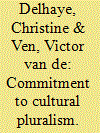

|
|
|
|
|
| Publication |
2014.
|
| Summary/Abstract |
Cultural policy has traditionally had close ties with the construction of the society as a nation state, which has been marked by its built-in tendency towards cultural homogenisation. Post-World War II, multicultural societies pose profound challenges to these traditional forms of cultural policy. Although, in the last decades, western democracies have been designing cultural diversity plans, this does not mean that governmental policies have successfully been translated in institutional practice. In the Netherlands, mainly established cultural institutions have failed to integrate diversity into their core business. Yet, there have been a few exceptions that continue to make attempts to adapt their programmes to address new populations. In this article, we use Parekh's view of a multiculturalism that reconciles unity and diversity, as a heuristic device that allows us to explore and examine the bottom-up diversity policies and practices of two Amsterdam-based cultural institutions: Paradiso and De Meervaart.
|
|
|
|
|
|
|
|
|
|
|
|
|
|
|
|
| 2 |
ID:
123189
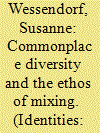

|
|
|
|
|
| Publication |
2013.
|
| Summary/Abstract |
The London Borough of Hackney is one of the most diverse places in Britain. It is characterised by a multiplicity of ethnic minorities, different migration histories, religions, educational and economic backgrounds both among long-term residents and newcomers. This article describes attitudes towards diversity in such a 'super-diverse' context. It develops the notion of 'commonplace diversity', referring to cultural diversity being experienced as a normal part of social life. While many people mix across cultural differences in public and associational space, this is rarely translated into private relations. However, this is not perceived as a problem, as long as people adhere to a tacit 'ethos of mixing'. This comes to the fore in relation to groups who are blamed to 'not want to mix' in public and associational space. The article discusses the fine balance between acceptable and unacceptable social divisions in relation to specific groups who are seen to lead separate lives.
|
|
|
|
|
|
|
|
|
|
|
|
|
|
|
|
| 3 |
ID:
102837
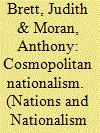

|
|
|
|
|
| Publication |
2011.
|
| Summary/Abstract |
This article challenges the theoretical opposition between nationalism and cosmopolitanism with empirical research on the ways in which a group of ordinary Australians talked about multiculturalism in the 1980s and again in the 2000s. It shifts attention from identity work to the understanding of day-to-day social relations: it finds that they are strongly nationalist and yet also display a cosmopolitan embrace of the benefits of cultural diversity. They draw on the inclusionary resources of Australian nationalism and its history to strengthen their cosmopolitanism and calm their anxieties about living with diversity. Their commonsense conceptualising of Australia's contemporary multicultural society in terms of a mix of individuals rather than an ensemble of groups is crucial to understanding why cultural diversity has been embraced within the framework of the nation.
|
|
|
|
|
|
|
|
|
|
|
|
|
|
|
|
| 4 |
ID:
120507
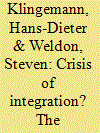

|
|
|
|
|
| Publication |
2013.
|
| Summary/Abstract |
The healthy functioning and long-term viability of the European Union (EU) ultimately depend on its citizens finding common cause and developing a shared sense of political community. However, in recent years, scholars and pundits alike have expressed doubts about whether the EU's growing cultural, religious and economic diversity is undermining the development of citizens' shared sense of political community, especially following eastern expansion. In this article, this question is examined using data on a key aspect of political community: transnational dyadic trust. Drawing on a unique set of opinion surveys from the formative years of the EU to the first wave of eastward expansion (1954-2004), the development and sources of dyadic trust among EU Member States is studied. While recognising the importance of diversity for trust judgments in the short-term, the prevailing viewpoint that it is also a long-term obstacle to integration is challenged. Instead, it is argued that citizens from diverse cultural and economic backgrounds can learn to trust one another and build a sense of political community over time through greater cooperation and interconnectedness. This theory is tested with data on bilateral trade density, which is seen as a proxy and precursor for other forms of cross-national interconnectedness. Employing longitudinal models, the article also goes beyond existing research to test the theories over time. The study makes a contribution to the research on European integration, suggesting that over time mutual trust and a shared sense of political community can indeed develop in diverse settings.
|
|
|
|
|
|
|
|
|
|
|
|
|
|
|
|
| 5 |
ID:
156715
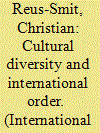

|
|
|
|
|
| Summary/Abstract |
The modern international order faces profound challenges. Power is shifting to non-Western states and diffusing to non-state actors, including transnational insurgents. This is more than a power transition: it also about culture. Western states now share the stage with powers such as China who bring their own cultural values, practices, and histories, and new forms of transnational violence are justified in the name of religious identity and belief. Some see this as a fundamental threat to modern international order, an order created by and for the West. Others see the “liberal” order as uniquely able to accommodate states and peoples of diverse cultures. How well equipped is IR to contribute to these debates? I review four recent works on the future of the modern international order, asking what conceptual, theoretical, and empirical resources they offer for understanding the relationship between cultural diversity and international order. This literature suffers from four limitations: culture is essentialized or bracketed; institutions are seen as either simple expressions of cultural values or structures that neutralize culture, with their recognition function ignored; the structural power of international orders—how they produce political and cultural subjectivities—is underappreciated; and international orders are conceived too narrowly as orders of sovereign states. To overcome these limitations, I advance a new perspective on cultural diversity and international order. International orders evolve in heterogeneous cultural contexts, and the governance of diversity is a key imperative of order building. In response, international orders develop diversity regimes: institutional norms and practices that define legitimate units of political authority, authorize certain forms of cultural difference, and relate the two. These regimes are essential to the legitimacy of international orders, but face two interrelated pressures for change: shifts in underlying material capabilities, and new claims for cultural recognition, often rooted in grievances against past or prevailing forms of recognition.
|
|
|
|
|
|
|
|
|
|
|
|
|
|
|
|
| 6 |
ID:
143228
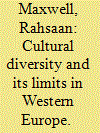

|
|
|
|
|
| Summary/Abstract |
The next generation of diverse Europeans will inhabit a world in which cultural mixtures are standard and historical nation-states are the starting points rather than the final definition of culture.”
|
|
|
|
|
|
|
|
|
|
|
|
|
|
|
|
| 7 |
ID:
083238
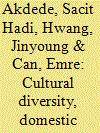

|
|
|
|
|
| Publication |
2008.
|
| Summary/Abstract |
This study investigates the relationship between cultural diversity, political violence and public expenditures. Using a cross-section of cultural diversity indices, it is empirically examined whether cultural diversity caused or intensified political violence in the 1980s and 1990s. It is found that economic factors were statistically significant in the intensity of the violence in the 1980s, whereas political and cultural factors were significant in the 1990s. In addition, ethnic diversity took a significant role in both starting the violence and the intensity of it in the 1990s.
|
|
|
|
|
|
|
|
|
|
|
|
|
|
|
|
| 8 |
ID:
076496
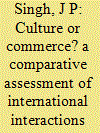

|
|
|
|
|
| Publication |
2007.
|
| Summary/Abstract |
Does international trade in cultural products threaten cultural diversity in the developing world? This article seeks to question the implied correlation by exploring the intellectual and empirical bases of the claims. Conceptually, I argue that cultural diversity viewed from the perspective of the nation-state is problematic. Politically, of course, nation-states make this claim themselves in protecting their self-interest globally. Empirically, this paper shows that nation-states at the forefront of the movement protecting cultural diversity are, in fact, top exporters of cultural products, something that is not apparent in the mercantilist position taken by these states with respect to international trade in cultural products. The paper then explores the position of developing countries explicitly taking advantage of globalization of culture to promote both their cultural distinctiveness as well as their exports. These "cultural voices," I conclude, are growing economically and socially and cannot be dismissed as playing second fiddle to those from the developed world.
|
|
|
|
|
|
|
|
|
|
|
|
|
|
|
|
| 9 |
ID:
099571
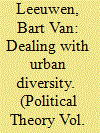

|
|
|
|
|
| Publication |
2010.
|
| Summary/Abstract |
Intercultural citizenship seems to benefit from certain generic aspects of city life that carry a negative quality, such as "blasé attitude" or the typical "indifference" of city dwellers. The main part of this essay argues that this observation allows the formulation of a moral minimum-a threshold conception-of intercultural citizenship in the urban setting, namely, what I call side-by-side citizenship. A certain level of indifference makes possible personal freedom and a tolerant multicultural city, although there are more ideal formulations of intercultural citizenship, such as in terms of agonism or cosmopolitanism. However, these more ambitious forms easily become too demanding given the muddle of everyday urban living conditions, which tend to promote mutual reserve and impersonal social relations. A modest and realistic conception of intercultural citizenship could prove crucial in motivating citizens to act according to some minimal standards.
|
|
|
|
|
|
|
|
|
|
|
|
|
|
|
|
| 10 |
ID:
100864
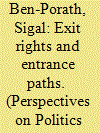

|
|
|
|
|
| Publication |
2010.
|
| Summary/Abstract |
The debate over the accommodation of culture in liberal democracies tends to emphasize exit rights. Autonomy is typically taken as a pre-condition for exit, and public schools are often charged with promoting or facilitating it. I argue that diversity liberals have a more justifiable view than that of autonomy liberals on cultural accommodation, but diversity liberalism too should reframe its view of exit rights. Narrow exit rights that protect basic human rights should be maintained and augmented with entrance paths into general society. I further suggest that for exit rights along with entrance paths to provide the morally required conditions for accommodating culture while respecting freedom, policies in this realm should be designed to address adults rather than children. I consider the effect of this dual change of perspective on the accommodation of culture in democratic institutions, including schools.
|
|
|
|
|
|
|
|
|
|
|
|
|
|
|
|
| 11 |
ID:
154257
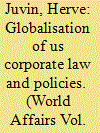

|
|
|
|
|
| Summary/Abstract |
This article raises an alarm about the expanding hegemony of big business promoted by the US and transnational corporations. The global reach of American jurisdiction is being used to exact heavy financial and legal penalties on foreign nations and companies and promote US interests in the name of economic globalisation, as part of the agenda for fi ghting corruption and terrorism. The article highlights the threats to national sovereignty, cultural diversity and economic autonomy posed by the ruling US centric financial system.
|
|
|
|
|
|
|
|
|
|
|
|
|
|
|
|
| 12 |
ID:
079072
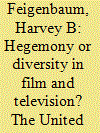

|
|
|
|
|
| Publication |
2007.
|
| Summary/Abstract |
In October 2005 UNESCO produced its Universal Declaration on Cultural Diversity. This was largely a response to the worries of countries, especially in Europe and not least of which France, which feared the damaging effects to their cultures if trade in entertainment products remained too one-sided. Generally the argument of this paper is that while initial tensions between the United States and Europe were motivated by the usual commercial concerns, Europeans were increasingly worried about the cultural impact of this commerce. The Japanese, however, have not been nearly so concerned as the Europeans about becoming 'Americanized'. This lack of tension between the United States and Japan in the area of film and television is due to several factors. First, there is a complementarity between American entertainment and the Japanese electronics industry. Second, the Japanese are major players in some aspects of the entertainment industry, most especially in the area of animation, and they are especially influential in Asia. Finally, issues of cultural conflict between the United States and Japan are simply less salient to Tokyo than those which characterize Japan's relations with its Asian neighbors
|
|
|
|
|
|
|
|
|
|
|
|
|
|
|
|
| 13 |
ID:
079922


|
|
|
|
|
| Publication |
2007.
|
| Summary/Abstract |
Studies of cultural differentiation have shown that social mechanisms that normally lead to cultural convergence-homophily and influence-can also explain how distinct cultural groups can form. However, this emergent cultural diversity has proven to be unstable in the face of cultural drift-small errors or innovations that allow cultures to change from within. The authors develop a model of cultural differentiation that combines the traditional mechanisms of homophily and influence with a third mechanism of network homophily, in which network structure co-evolves with cultural interaction. Results show that in certain regions of the parameter space, these co-evolutionary dynamics can lead to patterns of cultural diversity that are stable in the presence of cultural drift. The authors address the implications of these findings for understanding the stability of cultural diversity in the face of increasing technological trends toward globalization.
|
|
|
|
|
|
|
|
|
|
|
|
|
|
|
|
| 14 |
ID:
117883
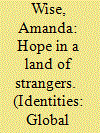

|
|
|
|
|
| Publication |
2013.
|
| Summary/Abstract |
This response to Ash Amin's new book, 'Land of Strangers' considers his argument that an 'urban commons' of multiplicity must be underpinned by a cultural imaginary that creates momentum and musters sentiment with affective force. He argues encounters are always deeply mediated and attitudes shaped by material, technological and symbolic influences with provenances near and remote. This paper targets the sphere of public narratives of encounter, providing two examples of interventions aimed at mobilising sentiment towards ideas of intercultural solidarity and care, and at re-working place identities in ways that highlight multiplicity, interdependency, and intersecting realities.
|
|
|
|
|
|
|
|
|
|
|
|
|
|
|
|
| 15 |
ID:
108018
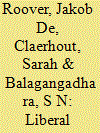

|
|
|
|
|
| Publication |
2011.
|
| Summary/Abstract |
The principles of liberal political theory are often said to be "freestanding." Are they indeed sufficiently detached from the cultural setting where they emerged to be intelligible to people with other backgrounds? To answer this question, this essay examines the Indian secularism debate and develops a hypothesis on the process whereby liberal principles crystallized in the West and spread elsewhere. It argues that the secularization of western political thought has not produced independent rational principles, but transformed theological ideas into the "topoi" of a culture. Like all topoi, the principles of liberalism depend on other clusters of ideas present in western societies. When they migrate to new settings, the absence of these surrounding ideas presents fundamental obstacles to the interpretation and elaboration of liberal principles. The case of Indian secularism illustrates the cultural limitations of liberal political theory rather than showing its universal significance.
|
|
|
|
|
|
|
|
|
|
|
|
|
|
|
|
| 16 |
ID:
109935
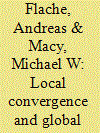

|
|
|
|
|
| Publication |
2011.
|
| Summary/Abstract |
How can minority cultures resist assimilation into a global monolith in an increasingly "small world"? Paradoxically, Axelrod found that local convergence can actually preserve global diversity if cultural influence is combined with homophily, the principle that "likes attract." However, follow-up studies showed that this diversity collapses under random cultural perturbation. The authors discovered a new source of this fragility-the assumption in Axelrod's model that cultural influence is interpersonal (dyadic). The authors replicated previous models but with the more empirically plausible assumption that influence is social-people can be simultaneously influenced by several network neighbors. Computational experiments show that cultural diversity then becomes much more robust than in Axelrod's original model or in published variations that included either social influence or homophily but not both. The authors conclude that global diversity may be sustained not by cultural experimentation and innovation but by the ability of cultural groups to discourage those activities.
|
|
|
|
|
|
|
|
|
|
|
|
|
|
|
|
| 17 |
ID:
182407
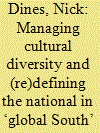

|
|
|
|
|
| Summary/Abstract |
This themed section brings together papers that were first presented at the conference ‘Cultural pluralism in cities of the “global South”’ held at the European University Institute in Florence on 20 and 21 March 2019. The three contributions explore the formation, representation and management of cultural diversity (broadly defined to include ethnic, racial, linguistic and religious diversity, today and in the past) in cities outside the West and how these processes get entangled with definitions and redefinitions of the nation and national identity (Triandafyllidou 2017). In doing so, they focus on a set of themes – the politics of cultural diversity, the transformation of the urban ‘global South’1 and the ongoing project of nation building – which, to date, have been addressed largely in isolation.
|
|
|
|
|
|
|
|
|
|
|
|
|
|
|
|
| 18 |
ID:
157683
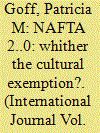

|
|
|
|
|
| Summary/Abstract |
The North American Free Trade Agreement renegotiation has created uncertainty around a number of provisions, including the cultural exemption. I argue that Canadian government advocacy of a cultural exemption will take place in a new context due to the approaches they have favoured in recent trade agreement negotiations, and to economic shifts driven by digital technologies.
|
|
|
|
|
|
|
|
|
|
|
|
|
|
|
|
| 19 |
ID:
141381
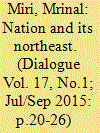

|
|
|
|
|
| Summary/Abstract |
The magnitude of the cultural diversity of the northeast almost defies imagination. Perhaps there is no comparable geographical area in the world which is home to cultural diversity of this magnitude. The linguistic diversity of the region is an inalienable part of this cultural diversity. Difficult as it is to individuate languages - (Is there one Bengali language or is there a cluster of fairly distinct languages individuated as a single language for a variety of reasons?) – there may be – on a fairly stringent count - close to two hundred languages spoken in the northeast. Many of these languages are on the UNESCO list of ‘endangered’ languages. Although, the number of languages may not quite coincide with the number of cultures, because a single culture can frequently embrace considerable linguistic variations, languages that are, in very large measure, independent of each other (e.g. Bhojpuri and Khasi), embody distinct cultures.
|
|
|
|
|
|
|
|
|
|
|
|
|
|
|
|
| 20 |
ID:
172321
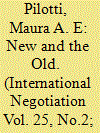

|
|
|
|
|
| Summary/Abstract |
Using a case study method, we examine how practitioners, including judges, arbitrators and community mediators, view dispute resolution in the Kingdom of Saudi Arabia (KSA). The goal of this study is to assess whether traditional approaches to dispute resolution coexist with or are discarded for imported modes. Participants were selected through convenience sampling. Structured interviews involved (a) participants’ general theoretical foundations, (b) key principles that govern their professional role, (c) their views of different roles, and (d) the extent to which traditional modi operandi persist. The results highlight the dominance of principles and practices of Sharia law over common law. Although the use of formal Western procedures was reported in commercial disputes and rarely in family and tribal matters, implementation was undeniably shaped by religious and kin-based social habits and values.
|
|
|
|
|
|
|
|
|
|
|
|
|
|
|
|
|
|
|
|
|